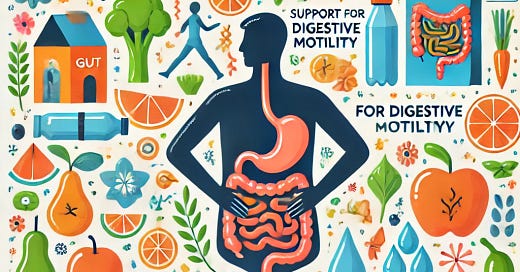TLDR - Digestive motility refers to the movement of food, liquid, and waste through the GI tract. Proper motility prevents issues like constipation, reflux, bloating, bacterial overgrowth, and more.
Migrating Motor Complex (MMC)
The MMC is a recurring motility pattern that occurs in the stomach and small intestine during fasting states. It serves as a housekeeping function, sweeping residual undigested material through the digestive tract, preventing bacterial overgrowth in the small intestine.
The Vagus Nerve
The vagus nerve plays a significant role in regulating the MMC and overall digestive motility. This nerve controls involuntary functions of the digestive system. It stimulates peristalsis, the series of wave like muscle contractions that move food through the digestive tract. Proper vagus nerve function is important for maintaining effective motility and preventing digestive disorders.
Benefits of Strong Digestive Motility
Efficient Breakdown of Food: Strong motility ensures that food is broken down effectively, allowing digestive enzymes and stomach acids to thoroughly process the food. This breakdown is important for the proper absorption of nutrients.
Optimal Nutrient Absorption: As food moves through the small intestine, nutrients are absorbed into the bloodstream. Proper motility ensures that food spends the right amount of time in each section of the digestive tract, maximizing nutrient absorption.
Effective Elimination of Waste: Strong motility aids in the timely elimination of waste products from the body. This prevents the accumulation of waste and toxins, which can lead to various health issues.
Consequences of Poor Digestive Motility
Constipation: Slow movement of food through the digestive tract can lead to constipation, causing discomfort, bloating, and pain. Chronic constipation can also lead to more serious conditions like hemorrhoids and anal fissures.
Bloating: Poor motility can cause gas to build up in the digestive tract, leading to bloating and discomfort. This is often accompanied by a feeling of fullness and distension in the abdomen.
Bacterial Overgrowth: Inadequate motility can result in bacterial overgrowth in the small intestine, a condition known as Small Intestinal Bacterial Overgrowth (SIBO). SIBO can cause symptoms like diarrhea, malabsorption, and nutrient deficiencies.
Others: Issues like acid reflux, indigestion, and food intolerances can all be exacerbated by poor digestive motility.
Maintaining Healthy Digestive Motility
Follow The Foundations: Everything from the foundations supports digestive motility.
Support the Migrating Motor Complex: Ensure you have periods of fasting between meals (4-5 hours). Avoid snacking between meals and overnight to give your digestive system adequate time for the MMC cycles.
Support your Vagus Nerve: Practices like deep breathing exercises, meditation, singing, humming, and gargling can all enhance vagus nerve function. There are also vagus nerve stimulating devices, but I would only suggest looking into those after all other avenues have been exhausted.
Stay Hydrated: Drinking plenty of water helps maintain the smooth movement of food and waste through the digestive tract.
Eat Prebiotics: Prebiotics are non digestible food components that promote beneficial bacteria in the gut. This results in healthy gut flora and enhanced short chained fatty acid production.
Many people promote fiber but why is that? Fiber is mostly non digestible so why would that help with motility? My opinion is that the prebiotic portions of fiber is what is beneficial and should be supported to maintain regular bowel movements.
Exercise Regularly: Physical activity promotes healthy digestion by stimulating intestinal contractions.
Manage Stress: Stress can negatively impact vagus nerve function and digestive motility.
Supplements: Ginger and artichoke leaf can support digestion and overall gut health. Ginger can help reduce inflammation and promote stomach emptying, while artichoke leaf is known to support liver function and bile production, aiding in digestion.
Medications: Erythromycin 50 mg capsules can be prescribed to improve gastrointestinal motility. I’d suggest using this as a last resort.



